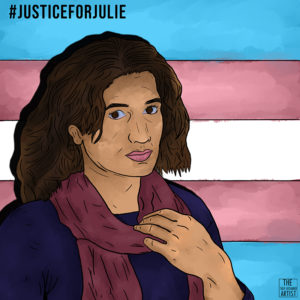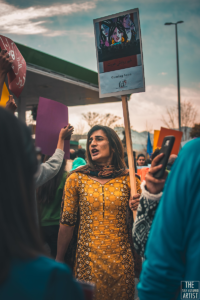 Can you tell me about the image you made that circulated social media platforms in support of Julie Khan?
Can you tell me about the image you made that circulated social media platforms in support of Julie Khan?
I met Julie last year at the 2019 Aurat March for women’s rights in Islamabad, where I photographed her and got to know her. Throughout the year she started posting videos to a YouTube channel called TCM and became somewhat of a public figure. One day I was scrolling down Twitter and I saw that she was arrested. I was really affected by the whole thing and I knew that people in Pakistan don’t really raise up their voices for transgender people usually, or the LBGT community as a whole. I decided to play my part and make an illustration of one of her pictures. The thing is, being a mass communications student, I know that people these days do not like to read long essays or paragraphs on Facebook or Twitter. It’s always a picture or small video that attracts them. I thought that would be the best strategy to attract as many people as possible and it kind of worked because I have a following on Twitter, so it really started trending. The news got to them and the whole trend started. There was a protest that happened in Islamabad. People attended that despite the COVID-19 situation around here right now. It was really heartwarming to see that people were showing up for the first time like this for a transgender person.
How have you used your artwork, filmography, and photography for activism?
I have been covering protests including the women’s rights march, the climate march, and the students’ march. I have a really distinctive photography style that captures the casual moments that you miss. I use that to highlight these moments in the protests to show that people are out there fighting and you can join them as well. I have been using these creative outlets to speak up about different issues that we are facing in Pakistan, specifically women’s rights and climate issues.
As an artist, you use the tagline “Self-Proclaimed Artist.” Where did that name come from?
That came from the fact that everything I’ve learned about photography or illustration, or even filmmaking, has been my own learning. I learned it on the internet, by my own experience. There’s no formal education that holds that creative mind. I got my bachelor’s degree in mass communication but I’ve always had a creative side to me so I write, make short films, and create documentaries. I do photography and illustration like a side hobby.
 Readers may have assumptions about what it is like for women and LGBTI people in Pakistan. I’m wondering if you can tell me, from your lived experience there, what is the current political reality.
Readers may have assumptions about what it is like for women and LGBTI people in Pakistan. I’m wondering if you can tell me, from your lived experience there, what is the current political reality.
Women, trans people, and the LGBT community as a whole has been oppressed in Pakistan. You might have heard or read about how there have been different movements rising up to ask for rights. One of the most successful movements that we had in the past were the Aurat marches. It’s a women’s movement that protests every year and they ask for rights. During those protests, the trans community joined in and was warmly welcomed. I think that was where they both merged and they started raising their voices.
As far as it goes how it is for women in Pakistan, it’s really difficult. Since your childhood, you’ve been told to be a certain way and not allowed to be yourself. And the worst part is that you can’t really do anything about it because the law over here does not protect women as it should. The issue is that the women’s rights movement has received a lot of backlash because of some religious tropes over here which claim that the rights of women goes against the religious teachings.
Officially it’s a criminal offense, according to the law, to be gay, lesbian, or queer. There have been instances when people came out publicly and they were unfortunately either killed or they had to seek asylum because their lives were at risk. Additionally, most of the media content that is published has no LGBT representation. There are some drama movies or serials where they would hint toward an LGBT character. They’re mostly censored over here. Even news articles about the community will be censored by the government.
When we talk specifically about the trans community, I think it’s the most difficult. Even though Pakistan has given trans people their rights to equality, I didn’t see education related to transgender issues or safe medical facilities for transgender people. Everything is addressed in the law, but society is not very accepting and still discriminates against trans people. There have been some really gruesome incidents in the past. For example, in 2016, there was a trans person named Alisha who was shot seven times because she refused a kidnapping and a rape attempt. When she was rushed to the hospital, the doctors didn’t admit her or treat her because they were confused about whether to admit her in the males’ ward or the females’ ward. Her friends kept trying to reason with the doctor to just admit her anywhere and just save her life, and in return, they were either harassed by the people around. There have been such incidences and it’s pretty common. You hear every other day that a trans person was killed because they resisted violence against them. There is a resistance that hopefully will make some change in the coming years.
Do you think there’s a future of LGBTI acceptance in Pakistan?
I hope so because I recently have seen, especially on social media, there has been a discussion about LGBTI rights, especially among the youths. There is a hope I see that maybe ten, fifteen, twenty years down, there might be some change, but it’s very hostile right now.
Do you anticipate continuing to use your art for activism and social movements?
I have been doing that in the past and especially after this movement, I’ve seen how people are reacting to it and how they are acknowledging the fact that this can make a difference. It kind of proves to me that my art might make a difference so I think it will be a mistake to let it go.

